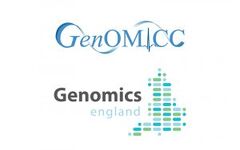Genomics England
 | |
Genomics England is a company set up and owned by the Department of Health and Social Care to run the 100,000 Genomes Project,[1] which aims to sequence 100,000 genomes from NHS patients with a rare disease and their families, and patients with cancer. An infectious disease strand is being led by Public Health England.[2][3][4]
In October 2018, Secretary of State for Health and Social Care, Matt Hancock, announced that the program had been expanded with a new goal of sequencing five million genomes within five years. He also announced that starting in 2019, the NHS will offer whole genome sequencing (WGS) to all children suspected of having a rare genetic disease or with cancer.
In July 2019, Chris Wigley was appointed CEO of Genomics England, starting in October 2019.[5] Wigley is a former McKinsey executive known for applying machine-learning and artificial intelligence technology to transform performance. Baroness Blackwood, Parliamentary Under Secretary of State, said: "I want to personally congratulate Chris on his appointment as Chief Executive of Genomics England. He is an excellent leader with a proven track record of delivery, and I am very confident that Genomics England will go from strength to strength under his leadership. I want to also put on record my thanks to Sir Mark Caulfield for his work as interim CEO over the past six months. He has made a fantastic contribution to genomics over his career and I am very pleased that this was recognised with a knighthood in the Queen’s Birthday Honours."[6]
On 1 May 2020, Baroness Blackwood was appointed Chair of Genomics England, succeeding Baroness Dido Harding, who had served as Interim Chair since November 2019. Health and Social Care Secretary Matt Hancock said: "It’s a great pleasure to welcome Baroness Blackwood as the new Chair of Genomics England. Nicola brings huge experience to the role, including from her time as Life Sciences Minister, and I’m certain she will drive forward the crucial work already underway to better our understanding of the human code and the health benefits that can bring. I thank Baroness Dido Harding for the significant contribution she made to Genomics England, helping to spearhead the organisation as a world leader in genomic science."[7]
On 13 May 2020, a new partnership was announced with GenOMICC to sequence human genomes in the fight against COVID-19:
- Genetic susceptibility to coronavirus to be tested in ground-breaking nationwide study
- Genomes of thousands of patients with coronavirus will be sequenced to understand how a person’s genetic makeup could influence how they react to the virus
- Genomics England partners with University of Edinburgh to lead research drive to support the search for new treatments[8]
References
- ↑ "Rare inherited skin diseases and the Genomics England 100 000 Genome Project", British Journal of Dermatology, volume 174, issue 2, year 2016, pages 257–258
- ↑ "10,000 rare-disease genomes sequenced", Nature Biotechnology, volume=32, issue 1, 2014, page 7
- ↑ "Q&A: Mark Caulfield", Nature, volume 527, issue 7576, year 2015, pages S5
- ↑ "The DNA of a nation" Nature, volume 524, issue 7566, year 2015, pages 503–505
- ↑ "Genomics England Appoints AI Specialist Chris Wigley as CEO"
- ↑ "Chris Wigley appointed CEO of Genomics England"
- ↑ "Baroness Blackwood appointed Chair of Genomics England"
- ↑ "New partnership to sequence human genomes in the fight against coronavirus"
Wikipedia is not affiliated with Wikispooks. Original page source here